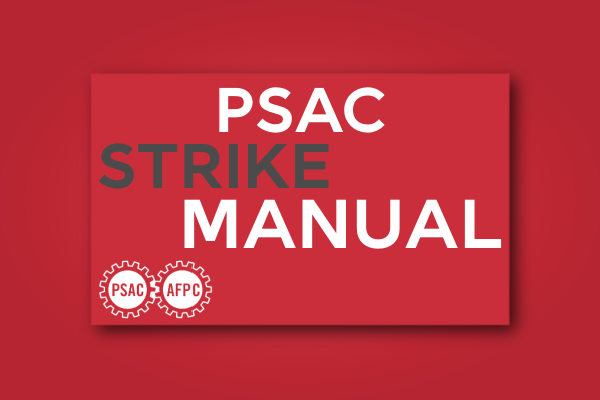
5 minute read
Labour and strikes
from PSAC Strike Manual
by YEU/PSAC
The value of our labour
As workers, our labour is of value. It is valuable to us and to our families. We exchange it for wages to pay bills, buy groceries or pay for our children’s education.
Advertisement
Democracy in action
There are many misconceptions about strikes. The media doesn’t often reflect the experiences of workers walking the picket lines. The following are some myths about strikes:
Myth: Strikes are violent and not in the public’s interest.
Fact: The majority of picket lines are non-violent. This misrepresentation results from the news media’s focus on the rare scuffles that occur on the picket line.
Myth: Workers who strike are acting unlawfully.
Fact: Unionized workers have a right to strike when their contract negotiations fail and the members have passed a strike vote.
Our labour is of considerable value to our employer. The removal of our labour is the most powerful tool we have in negotiations.
I was new to the federal public ser vice when we went on strike in 1980. Young and without a lot of financial obligations, I was ready, knowing a strike was for the benefit of ever yone and not just a few. During that period I learned so much and developed friendships that have endured.
Myth: There is nothing to gain by striking. Striking workers never recover the earnings lost on the picket line.
Fact: Aside from the dignity and respect the workers gain from their employer by voting to strike, the improvements made to the collective agreement often result in not only material, but non-material gains as well. In many cases, the monetary gains made over the life of the collective agreement surpass any losses incurred during a strike.
Myth: A strike has little impact on the employer.
Fact: The very threat of a strike will often force employers to bargain seriously. They can’t get any work done when the majority of their workforce withholds its labour.
Myth: Unionized workers strike too much.
Fact: At PSAC, less than five per cent of contract negotiations result in a strike. We understand the challenges facing members when they vote to strike. We strategize to move negotiations along and to achieve a collective agreement efficiently. The goal is never to go on strike.
Myth: Union bosses call strikes.
Fact: The idea of a “union boss” is flawed. Members democratically run their unions, electing their leadership and voting to go on strike when necessary. If the members vote favourably to strike, the National President of PSAC authorizes the strike action. The mandate comes from the grassroots, not from the “top down.”
Strikes are not taken lightly – by the leaders of the union, by the members elected to represent the bargaining unit, or by the rank-and-file workers. Understanding the strike process helps us work together to a successful resolution.
The right to strike
Workers fought hard to achieve the right to strike in all of the major democratic countries around the world. During industrialization, workers were exploited. Long hours, unhealthy work, unsafe conditions, low pay, no overtime, and seven-day work weeks were the norm.
Workers’ efforts generated wealth for owners and the business class. Yet poverty and despair was the reality for most workers. They chose to unite and stand up against economic and social injustice.
Many fought to their death to achieve rights in the workplace. Over generations laws were enacted granting workers the right to bargain collectively and with that, the right to strike legally when negotiations fail.
PSAC and strikes
PSAC runs effective strikes that win better salaries, benefits and working conditions for our members. It’s part of our history.
Here are some of the lessons we’ve learned over the years:
• We must use a variety of pressure tactics to achieve our goals.
• Our tactics should escalate progressively. We don’t engage in actions early on that we won’t be able to duplicate or have impact with a second time.
• We aim for the element of surprise in our actions.
• We plan, plan and plan some more – and are ready for an alter nate action if things don’t go as planned.
• We vary our targets – from media releases to impacting services to slowing production –always putting the employer on the defensive.
• We develop plans for “essential” workers so they can be part of the action, even if they are not allowed to join us on strike.
• We prepare large-scale activities such as “solidarity parties” from time-to-time, bringing together members, labour allies and community partners to boost the morale of striking workers
• We keep ahead of the employer by communicating regularly with members.
• We engage area councils, regional councils, regional women’s committees and all other PSAC equity-seeking committees to support the striking workers.
• We continually emphasize integrity, validity and fair ness in our demands and in our actions.
During a general strike with Treasury Board units in 1991, the Ottawa Regional Women’s Committee organized a sit-in at the office of the Minister responsible for the Status of Women in order to draw attention to the issue of pay equity.

